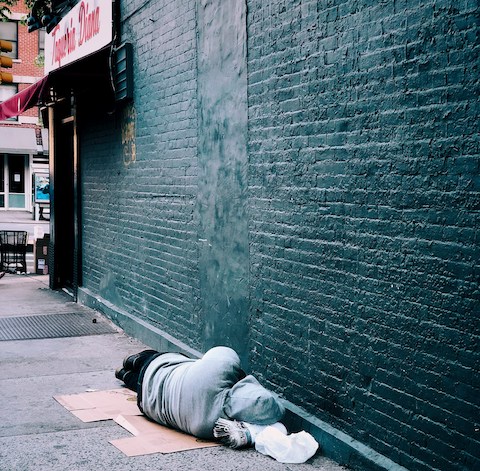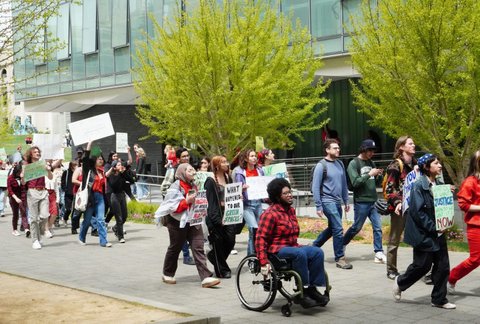
23 Apr U.S. Supreme Court Hears Arguments About Constitutionality of Anti-Camping Laws

Supreme Court justices agreed Monday that the problem of people sleeping on the streets is “a difficult policy issue” for city governments. (Photo by Jon Tyson on Unsplash)
By Joe Dworetzky
Bay City News
The U.S. Supreme Court agreed on one thing Monday morning: The problem of people sleeping on the streets is “a difficult policy issue” for city governments. Beyond that, views diverged.
The court heard nearly two and half hours of arguments about the city of Grants Pass, Oregon’s challenge to a lower court determination that it was unconstitutional to criminalize sleeping on city streets if there was no alternative place for the person to go to sleep.
The case has been closely watched in San Francisco because of the city’s highly visible “homelessness problem” as well as the injunction imposed against the city from clearing encampments unless it has first made a genuine offer of shelter that is declined by the people being displaced.
Litigants on both sides of that litigation — the advocacy group Coalition on Homelessness and the city of San Francisco — filed amicus or “friend of the court” briefs in the high court advocating their respective positions.
The Grants Pass ordinance at issue was styled as an “anti-camping” ordinance, but much of the discussion focused on its application to situations where the alleged camping did not involve tents or fires but simply sleeping in public spaces with a blanket.
The plaintiffs’ lawyers tried to simplify and focus the argument by saying that the challenged ruling at issue did not bar the city from enforcing laws against public fires or tents or public defecation/urination or other public health matters. What was unconstitutionally “cruel and unusual” under the 8th Amendment, was a 24/7 ban on sleeping when there was no alternative.
The arguments all had to deal with the legacy of the Supreme Court’s 1962 decision in Robinson v. California which held that a state law could not punish a person for the status of being a drug addict, though it could criminalize the conduct of using drugs.
Counsel for Grants Pass argued that the ordinance in the current case punished conduct, not status. In her view, the case was “worlds away from Robinson” because camping was clearly conduct. She said it was the act of sleeping, not the status of being homeless, that was being punished and therefore the ordinance was permissible under Robinson.
The plaintiffs argued that because sleeping is an essential activity of all humans — no different than breathing — and the ordinance was only applied to people who were homeless and had nowhere to go, the law was, at its essence, a criminalization of the status of being homeless. In other words even if the statute technically criminalizes conduct, the circumstances make clear that is really the punishment of status.
Several of the conservative justices focused on the “slippery slope” that the conduct/status distinction would create when courts had to decide what to do in situations where a plaintiff arguably had no choice but to engage in the forbidden conduct. Among the hypothetical situations: a law against stealing when applied to a robber who had no other way to get food or a law against drinking as applied to a plaintiff who was an alcoholic.
Another round of questions was based on how it would be determined whether there really was no alternative location for the person to sleep. (The lower court decision found a constitutional violation only if the person had no place to sleep besides the street.)
Some of the justices wanted to know what would happen if there was a city shelter but a person could not bring his or her pet dog and refused to go alone. Or if the person was mentally ill and had a genuine — but irrational — fear of being in the shelter. In those cases, was there really no place to sleep? And if so, who would make that decision and when? Would it be the police officer on the ground or a federal judge after the fact?
Counsel from the Office of U.S. Solicitor General tried — though perhaps not completely successfully, judging by the onslaught of questions — to thread the needle by taking the position that the Robinson case is properly applied to situations involving involuntary homeless individuals.
The Solicitor General’s Office is part of the U.S. Department of Justice and handles litigation at the Supreme Court on behalf the United States and is frequently invited by the court to express its position on matters of public importance.
Counsel for that office argued that the Grants Pass ordinance did not pass the Robinson test, because it essentially banished the homeless from the town.
With no place to sleep, a homeless person had no choice but to leave. The lawyer cited a comment made during the passage of the ordinance to the effect that its purpose was to make public sleeping so difficult that the homeless would leave.
The solicitor general’s counsel thought however that the lower court was mistaken in failing to recognize that Grants Pass had broad power to include “time, place, and manner” limitations when addressing public sleeping. In other words, in his view it would be possible for Grants Pass, for example, to require that public sleeping be limited to parks or forbidden within 500 yards of a school in order to promote neutral public health and safety goals.
He argued that those type of neutral rules have been widely recognized as lawful in other areas of constitutionally protected activity.
For example, while the First Amendment prevents a government from forbidding marches that advocate for a particular point of view, it doesn’t prevent a city from saying that all speakers need a permit to have a parade, whatever point of view they advocate.
Justice Amy Coney Barrett was particularly interested in the fact that Oregon law allows a defendant to raise the “necessity” of his or her conduct as a defense to a criminal prosecution. Barrett wondered why that didn’t solve the problem — if one was charged with violating the anti-camping law, they could raise necessity to prevent conviction.
Plaintiffs’ counsel pointed out the state law was untested and had never been applied in this context.
Barrett expanded her point by wondering why the focus should ever be on an an anti-camping ordinance at the pre-enforcement stage — as it was in the Grants Pass case.
In her view, many of the issues turned on an individual-by-individual analysis, and were best undertaken after or as part of a criminal proceeding.
As is commonly the case with arguments at the high court, some of the justices asked “friendly” questions, less to be informed than to elicit points supportive of the questioner’s point of view.
The Grants Pass case has been widely followed locally. San Francisco was one of more than 80 organizations — roughly evenly divided between supporting Grants Pass or the plaintiffs — that weighed in though amicus briefs.
The city’s brief lined up with the Grants Pass side of the issue, though the city’s core focus was on the difficulty that the 9th Circuit decisions — both Grants Pass and the earlier case Martin v. City of Boise — created for local governments trying to deal with the situation on the streets.
The Coalition on Homelessness for its part was highly focused on the fundamental unfairness of making people into criminals because governments have failed to insure that there is adequate housing and shelter available.
A few of the liberal justices seemed to question whether the case should actually be decided by the Supreme Court in light of the fact that one of the named plaintiffs had died and therefore is no longer affected by the ordinance. However, most of the justices did not seem interested in using that fact to duck the hard questions the case poses.
As in many of the most socially contentious cases in the Supreme Court, the justices’ comments seemed to line up with political divisions within the court, with the more liberal justices looking to uphold the lower court decision and the conservative majority troubled by the implication of doing so.
Because of the broad recognition that homelessness raises hard policy questions, it seems safe to expect that any decision will try to insure that local governments have broad flexibility in figuring out the best approach in their jurisdictions.
A decision in the case is widely expected before the end of the court’s term on June 30.
Copyright © 2024 Bay City News, Inc. All rights reserved. Republication, rebroadcast or redistribution without the express written consent of Bay City News, Inc. is prohibited. Bay City News is a 24/7 news service covering the greater Bay Area.






No Comments